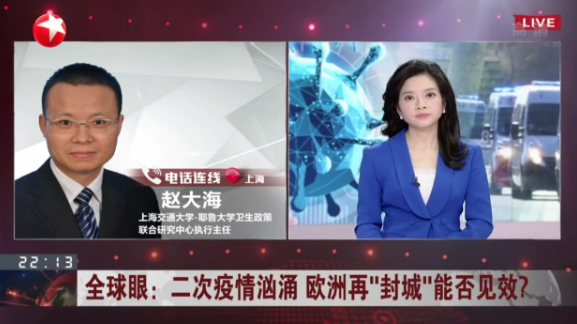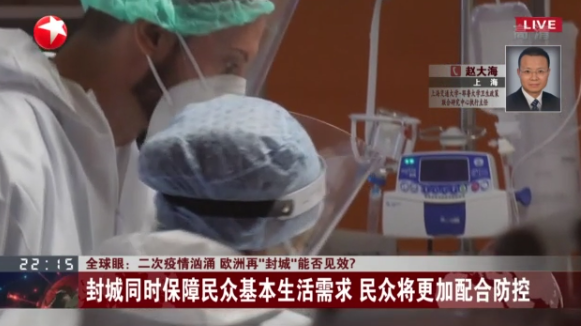上海交大赵大海关于新冠疫情和卫生政策第60次在电视台访谈评论:欧洲封城应有效抑制第二波新冠大暴发
上海交通大学国际与公共事务学院博士生导师、上海交通大学-耶鲁大学卫生政策联合研究中心执行主任赵大海,自新冠肺炎疫情暴发以来,对于新冠疫情暴发、防控以及医疗卫生体制改革第23次接受上海电视台专访,也是第60次接受央视、上视专访。2020年10月29日,赵大海在东方卫视的《今晚》节目,就法国和德国采取“封城”的措施应对新冠疫情的第二波大暴发等话题进行了直播访谈。现将专访内容摘录如下。

主持人:首先请您判断一下,欧洲国家采取了封城行动之后,二波疫情能否得到有效抑制?
赵大海:首先,我的回答是肯定的,会得到有效抑制。然而,我不得不说,欧洲国家采取封城行动太晚了。其实,欧洲各国在八月份就普遍出现了新冠疫情的第二波暴发。然而欧洲各国在长达近三个月的时间内,一直不采取严格的防控措施,最终导致了现在欧洲新冠疫情第二波的大暴发,现在每日新增病例欧洲多个国家超过一万例,远远比第一轮更为严重。在这个前提下,法国、德国等欧洲国家被迫采取了封城措施。对于新冠疫情而言,只要采取严格的防控措施,只要实施封城措施,就一定会对新冠疫情的暴发起到抑制作用。

主持人:然而我们也看到,就在欧洲各国加紧封城的同时,25日晚至今,意大利多座主要城市接连爆发示威活动,要求政府撤销封锁措施。欧洲乃至大部分西方国家奉行的理念中,个体自由是社会价值的根本。而民众对封城的不满还会加大对政府和执政党的不信任,欧洲各国该如何平衡抗击疫情与民众的冲突?
赵大海:无论是意大利,还是欧洲其他国家,在新冠疫情暴发第一轮的时候,包括意大利在内的欧洲国家均采取了封城等严格防控措施,大部分公众是支持的,而且也取得了积极的防控效果。面对第二波疫情的暴发,欧洲国家采取封城措施之所以会遭到公众反对,我认为还主要不是所谓的个体自由的社会价值问题,更应该是公众对政府没有防范住新冠疫情第二波的暴发,不得不又采取封城措施的失望所导致的。对于该如何平衡抗击疫情与民众冲突,一方面政府得为封城之后,公众基本生活的保障拿出可靠的对策来;另一方面,政府除了采取封城等被动防控措施之外,完全可以借鉴疫情防控成功国家的经验,譬如通过大面积的核酸检测等主动疫情防控手段,尽可能快速地将新冠确诊病例找出来,缩短封城的时间。
供稿者:国务学院
日期:2020年10月30日
Dahai ZHAO’s 60th comments on TV during the pandemic: The second wave of COVID-19 outbreak should be effectively restrained in Europe
Dahai Zhao, a doctoral supervisor at the School of International and Public Affairs of Shanghai Jiao Tong University and Executive Director of Shanghai Jiao Tong University-Yale University Joint Research Center for Health Policy, has been interviewed by ShanghaiTV for the 23rd time (the 60th time by CGTN / ShanghaiTV) since the COVID-19 pandemic. On October 29, 2020, Zhao commented on France and Germany have taken "lockdown" measures in response to the second wave of the outbreak on “Tonight” of CGTN.
Anchor: First of all, please judge whether the second wave of the epidemic can be effectively suppressed after European countries have taken the city lockdown action?
Zhao Dahai: First of all, my answer is yes, it will be effectively suppressed. However, I have to say that European countries took lockdown action too late. In fact, the second wave of the COVID-19 epidemic occurred in European countries in August. However, European countries have not adopted strict prevention and control measures for nearly three months, which eventually led to the second wave of the COVID-19 epidemic in Europe. Now there are more than 10,000 new cases in many European countries every day. For example, far more serious than the first round. Under this premise, European countries such as France and Germany were forced to take measures to close the city. As far as the COVID-19 epidemic is concerned, as long as strict prevention and control measures are taken, as long as the city is closed, it will definitely suppress the outbreak of the COVID-19 epidemic.
Anchor: However, we have also seen that while European countries have stepped up their lockdowns, demonstrations have erupted in several major cities in Italy on the evening of the 25th, demanding the government to lift the blockade measures. In the philosophy pursued by Europe and even most Western countries, individual freedom is the foundation of social values. People's dissatisfaction with the closure of the city will increase their distrust of the government and the ruling party. How should European countries balance the fight against the epidemic and the conflict between the people?
Zhao Dahai: Whether it is Italy or other European countries, during the first round of the COVID-19 epidemic, European countries including Italy adopted strict prevention and control measures such as lockdown of cities. Most of the public supported it and also achieved A positive prevention and control effect. In the face of the second wave of the epidemic, the reason why European countries took measures to lock down cities was opposed by the public. I think it is not the so-called social value of individual freedom. It should be the public's response to the government's failure to prevent the COVID-19 epidemic. The outbreak of Poland was caused by the disappointment that the city had to be closed again. Regarding how to balance the fight against the epidemic and the conflict between the people, on the one hand, the government has to come up with reliable countermeasures to protect the basic life of the public after the city is closed; on the other hand, in addition to adopting passive prevention and control measures such as lockdown, the government can completely Learn from the experience of countries with successful epidemic prevention and control, such as through large-scale nucleic acid testing and other active epidemic prevention and control methods, to find confirmed cases of COVID-19 as quickly as possible to shorten the time of lockdown.
Contributor: SIPA, SJTU
Data: October 30, 2020

